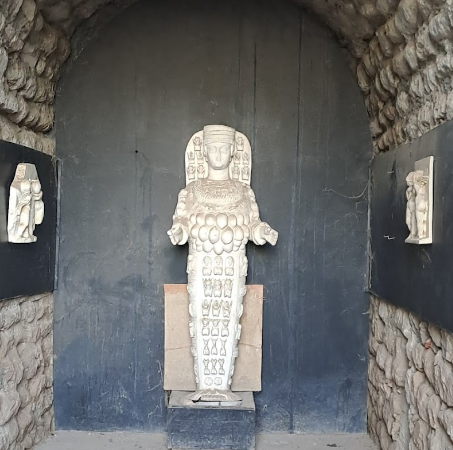
by Kristena Mears
Feb. 11, 2014
I love history. I can spend hours roaming the internet and finding facts and theories of days gone by. I want my historical fiction to be historically correct. So, when I set out to write the sequel to Under Penalty of Death, I wanted to know what someone who lived in Ephesus in 70AD would think, feel and what governed their lives. As I followed several leads and ideas, I ran across research from Dr Sandra Glahn in a book on Artemis called Nobody’s Mother and The City of Ephesus: A Short History.
Cities and countries change much from time period to period; century to century. If I wanted to know what the US was like in 1840, I wouldn’t look at 2020. What people loved and valued then is not what they love and value now. So, to write a story centered in Ephesus, I wanted to know what my characters would have seen, heard and smelled. (I may leave out what they smelled. Ephesus was modern for its time, but the sewers weren’t what they are today. lol)
Finding the God of Ephesus
In my research for my second book in my Slavery of the Heart series, I dug into the first century city and culture of Ephesus. I wanted to know what Ephesus was like during the time of Paul. What were her values, beliefs, and traditions? I discovered the main god of Ephesus was Artemus, but she wasn’t the Artemus that I had learned was the same as the Roman fertility god, Dianna. The Artemis of Ephesus was unique. The people of Ephesus didn’t depict Artemis in the same way as in other parts of Rome or explain her as they did in 400 BC. The name was the same, she was different.

Who was Artemis, in the minds of the first century Ephesians?
Artemis was worshiped all over the Roman Empire and was often referred to as Dianna by the Romans, but in Ephesus, she was uniquely different; she wasn’t the same god.
The Artemis of Ephesus was the older twin of Apollo and the daughter of Zeus and Leto. Legend has it that a god emerged with a small body, but their mind was fully formed and they possessed all knowledge and faculties. Artemis watched her mother, Leto, struggle for hours (some say days) giving birth to her brother, Apollo. It was only because of the help Artemis gave Leto that Leto could give a healthy birth and neither mother nor child died. This experience affected Artemis, and she went to her father Zeus and begged him to grant six wishes:
Artemis’ Six Wishes
- to never get married.
- to have more names than her brother Apollo.
- to have a bow and arrows made by the Cyclopes and a knee-length hunting tunic to wear.
- to bring light to the world.
- to have sixty nymphs for friends who will tend to her hounds.
- to have all the mountains as her domain.
Artemis of Ephesus was a virgin god. She was a savior of women in childbirth. She promised to either deliver a safe birth or a quick death using her fiery arrows to deliver the woman from a painful, long labor.
Artemis the Savior
Artemis was the first born, and was often referred to as the First Born of the Gods. She was called The Savior by her followers. She was called The Light. She was the patron protector of little children and young girls. She was the Virgin God of hundreds of women who worshiped her pledging to follow her in a life of celibacy. Research shows there were more women in Ephesus that were virgins than there were married women. This was not a common practice anywhere else in the Roman Empire.
Those that married and had children, relied on the benevolence of Artemis to save them from death as they bore their children.
Artemis was the goddess of magic.
Historical documents inform us that the Roman Empire discouraged and even forbade magic. But this wasn’t the case in Ephesus. Magic was an integral part of daily life, worship, and the economy. Artemis was at the center of all this, so it makes sense that she would carry bags of her magic on her person.
Researchers have discovered new archaeological evidence that reveals a different understanding of the meaning for the many bulbous appendages that were once assumed to be breasts on the statues of Artemis.
These appendages are not a sex symbols. There are no bumps depicting nipples that would be expected if she were a fertility god, but rather, these round appendages are sacks containing her magic. The idea of fertility is the opposite of all the stories and legends of the person and nature of Artemis. She had compassion for the pain of women giving birth, but wanted nothing to do with the act of getting pregnant.
Artemis was the Savior of Woman and Childbirth
The birth of a child was one of the leading causes of death during that time of history. In an age where there was little known about modern birthing safety and practices, giving birth was scary and dangerous. There were no hospitals or surgeons ready to give pain meds or do a c-section if the baby became stuck in the birth conal.
It wasn’t uncomon for a mother to be unable to push their baby from their body. The suffering often went on for days and ended in the death of both mother and child.
Because of Artemis’ experience at her own birth and the near death of her mother Leto and brother Appolo, She became the savior of woman and childbirth. She promised a quick birth or a quick arrow to prevent suffering.
Putting it all together
I find it very interesting that Paul uses the same language in his letters to Timothy that the Ephesians use of the god Artemis. Timothy was the elder in Ephesus, sent by Paul and instructed to spread the true gospel and to stop the silly fables spread from house to house. Since churches were in houses, could Paul be talking about followers of Artemis who went from house to house, (church to church) trying to mix the lies of Artemis worship with the truth of the gospel? Could these be the women he doesn’t want teaching?
When Paul talks of the fiery darts (or arrows) of the devil, would the people of Ephesus be thinking of the arrows of Artemis? And what of Paul telling Timothy that women would be saved through childbearing? The birth of a child was one of the leading causes of death during that time of history. Could that be a special promise to the Christian women in Ephesus that turned to Yeshua during their childbirth and rejected the teaching of Artemis that she would save women in their time of need?
I don’t know any of these ideas for sure, but they seem to make sense and bring history and scripture together. That’s what I love about writing historical fiction set in Biblical times.
If you’re interested in reading the first book in the Slavery of the Heart series,
you can find Under Penalty of Death here
Views: 19

Wow! That was very insightful, thanks for sharing. I knew a little of Artemis, but not how she differed in Ephesus compared to Rome at large.